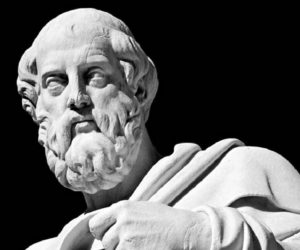250 B.C.E. Plato
 One of the main pillars which has been used to support an early dating the Letter of Aristeas is a passage of the Jewish philosopher Aristobulus, quoted in Eusebius concerning Plato. The passage reads as follows:
One of the main pillars which has been used to support an early dating the Letter of Aristeas is a passage of the Jewish philosopher Aristobulus, quoted in Eusebius concerning Plato. The passage reads as follows:
Praeparatio Evangelica 13.12.2.
It is evident that Plato (427–327 B.C.E) was a follower of our (e.g. Jewish) code of laws evident too that he diligently studied all their details. For before the time of Demetrius of Phalerum, before the dominion of Alexander (e.g. the Great) and of the Persians, (537 B.C.E.–332 B.C.E.) a translation had been made by others of the narrative of the leading forth of the Hebrews, our fellow countrymen, out of Egypt, and of the divine manifestation in all which befell them, and of the occupation of the promised land, with a detailed statement of the entire Law. It is thus abundantly clear that the aforesaid philosopher has derived many things therefrom; for he was a man of great learning, like Pythagoras, who also borrowed many of our doctrines and incorporated them in his decrees. But the complete translation of the Law and all its contents was made under the king surnamed Philadelphus (250 B.C.E.), thy ancestor, who displayed the greatest zeal, while Demetrius of Phalerum busied himself with the necessary arrangements.
Source: Hadas, Moses. Aristeas to Philocrates (Letter of Aristeas) (p. 26); Translation of H, St. J Thackeray, in his Letter of Aristeas (London, 1918), 95 f.



